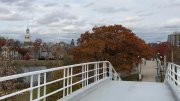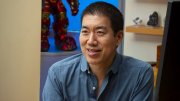Editor's note: A previous version of this article included a quotation containing an unsubstantiated accusation involving a professor. A professor has come forward to vigorously deny the accusation, and the Magazine has removed the quotation in question.
After a charged spring and summer involving government actions, lawsuits, and internal policy shifts, Harvard students have experienced a whirlwind of changes—and a profusion of competing opinions. Harvard Magazine gathered seven Harvard College students of diverse political stripes this week for a discussion about academic freedom, the campus climate, and recent changes in support for women, minorities, and LGBTQ students. One international student has been granted anonymity due to safety concerns.
This conversation has been edited for length and clarity.
The Harvard student panelists:
- Anonymous, International Student
- Julia Grinstead (Quincy House ’27, Economics), president, The Harvard Salient
- JaKayla Harris (Kirkland House ’27, Physics), president, Harvard Undergraduate Contemporary Collective, a pre-professional contemporary dance company
- Eli Johnson-Visio (Quincy House ’26, Neuroscience and Anthropology), president, Harvard Queer Students Association
- Richard Rodgers (Leverett House ’28, Undeclared), editor-in-chief, The Harvard Salient
- Mandy Zhang (Mather House ’27, Government and Economics), president, Harvard College Democrats
- Olivia Zheng (Kirkland House ‘27, Biomedical Engineering)
Harvard Magazine: Have you ever had experiences in the classroom where you felt you couldn’t speak freely?
Eli Johnson-Visio: There are some topics that I have been hesitant to touch in public— specifically the Israel-Palestine conflict. I feel as though outside of certain political frameworks, there are specific topics that seem to be polarizing on campus, that can lead to visceral reactions from other students if you say something that might be diverging from their opinion.
Olivia Zheng: I haven’t really had to deal with this as much because of my more STEM-heavy course load. But there was one gateway introductory Life Sciences course—I think midway through the course, the professor did go through, very briefly, how to reconcile evolutionary theory with the faith systems that many of the students might hold onto.
Mandy Zhang: I get the fear of trying to fit my answer in with what the class is saying. Sometimes, if I don’t feel the same way, or lean in the playbook or political stance or something, I feel like I would get judged.
“I can’t really speak freely at Harvard as an international student.”
Anonymous, International Student: I can’t really speak freely at Harvard as an international student. They were going around the table [in my Gen Ed class], about the current situation in the country, and I thought to myself, I can’t speak or anything.
It’s not like I was made to feel like I couldn’t speak. But again, I can’t really speak.
I’m pretty sure they just released that criticizing, I think, Israel is now grounds to ban the visa. So really, I don’t have an opinion. [Editor’s note: In federal court this summer, a senior Department of Homeland Security official said the government has consulted websites that post the names of immigrants engaged in controversial rhetoric against Israel when considering whom to investigate for possible deportation.]
Harvard Magazine: Is Harvard doing enough to support international students?
Johnson-Visio: I have had friends and close family members come to me in tears over their visas being revoked. When Trump initiated the revocations of certain student visas, I got contacted by a lot of my friends, [asking me to help them think] through whether or not they’d be here in the fall, whether or not they’d be able to continue their Harvard education.
On the [Queer Students Association] board, we have had individuals step down because they’ve been afraid of their name appearing on posts or op-eds.
Anonymous: My opinion is that Harvard is definitely not doing enough. I am, I suppose, grateful for the fact that they filed a lawsuit and that now the whole situation is frozen in time for a while. However, the way it was handled—I feel like, in a mediocre way—it could have been handled better.
We got the email [alerting international students that the Department of Homeland Security had requested information about student visa records by a given date] along with the news of [what] the administration had asked for—the deadline, I think, was April 30. I had a midterm then. We got no communication until April 30. And even then, it was nightfall when we got the email, it wasn’t even from the president. It said nothing like, “We sent your document to the administration, or we didn’t.” There was no information.
Richard Rodgers: Other than more transparency, what do you think the administration could have or should have done?
Anonymous: I would have appreciated if they handled it faster. I would appreciate an email saying, “We are aware of the situation” from them before April 30, at night.
Rodgers: Personally, my opinion would be that Harvard is doing enough.
Johnson-Visio: What actions make you feel that way?
“Harvard is an American institution…its highest order of care is to American citizens.”
Rodgers: I think that institutions have orders of care. I think that Harvard, being an American institution—its highest order of care is to American citizens. If the government is telling you, “Hey, you may have jeopardized national security with this group of students,” I think that you at the very least owe it in good faith to try to resolve that issue. I think that the first set of demands that Harvard got were basically entirely reasonable, things that any university worth its salt would already have been doing.
Admittedly, I think the follow-up things were far more nuanced and questionable. I don’t think that Harvard is an antisemitic institution. It’s ridiculous that students are being called antisemitic because they’re protesting human rights violations. That’s insane. It’s more complex than just: Harvard is right, the Trump administration is right.
Anonymous: Have you read all of the requirements the administration has asked of Harvard for international students?
Rodgers: No, I have not. With the first list of demands, I think that those are basically reasonable—not to ask of individual people, but to ask of an administration.
Anonymous: So, the requirement to give them all the video footage [of protest activity involving “nonimmigrant” students] available—do you find that reasonable?
Rodgers: The request to have the footage is a reasonable request. I think where it becomes complicated is that I disagreed with the Trump administration on what exactly constitutes criminal behavior. I don’t think that students should have their visas revoked, be removed from the College, because they’re protesting the Israeli government. I don’t think that a foreign student who is pro-Palestine on Harvard’s campus deserves to be kicked out and sent home. I think the government has the right to say, “Here are crimes. Please provide us footage so that way we can determine if these people are committing crimes.”
Harvard Magazine: The Harvard College Dean’s Office created an “Intellectual Vitality” initiative to support the exchange of ideas. Have you taken part in any Intellectual Vitality programming during the past year, and how did you find it?
Zhang: [This year,] compared to the year before, the [debate between the Harvard College Democrats and Harvard Republican Club during admitted students weekend] was a much better debate. [Conant University Professor] Danielle Allen moderated, and she set ground rules in the beginning—like no clapping, no cheering, no booing. I really appreciated it. It was a lot more civil between the Democrats and Republicans.
Grinstead: [At] The Harvard Salient, we planned and hosted a dinner for all of the other publications on campus that Intellectual Vitality very kindly ended up sponsoring and paying for. It was a pretty wonderful opportunity to get the head of The Crimson, the head of The Lampoon, and all of these publications together with the aim of celebrating Harvard’s decision not to ban door distribution. Obviously, a huge win for The Harvard Salient as a publication—but really, all campus publications. [Editor’s note: The Salient had battled College leaders for the right to leave publications outside the doors of student dorms.]
Rodgers: There’s an assumption that these events are not going to happen in good faith, and that things that are sponsored by Intellectual Vitality are going to be one-sided or, at the very least, milquetoast. Nobody on either side is going to really say what they want to say, because it is still a University-sanctioned event. From what I’ve seen going to events, they’re a lot more successful when they’re done by student [organizations]—even sponsored by [Intellectual Vitality], versus [Intellectual Vitality] doing something itself.
JaKayla Harris: As a leader of a student organization, we have training sessions each semester to make sure we’re still in good standing. Our officers are trained to handle situations like these. One of the sessions this past semester was called “Intellectual Vitality.” We had to discuss the best way to foster an environment where everyone can share their opinion, no matter what it is, without feeling judged or misheard.
Harvard Magazine: What do you think about the closure of campus diversity offices?
Rodgers: I’m generally pro-closure. But I think it’s strange that Harvard, which seemed to have been, until five minutes ago, very pro-having-these-organizations, would be so silent on it. You would think they would have a little bit more moxie in defending these things if they really believe in it.
Johnson-Visio: I’d like to learn more about why you’re in support of their closure.
Rodgers: In general, I don’t see the value in these offices. If anything, I think that they’re somewhat detrimental. There’s definitely value in being able have free association with people that you have things in common with. I don’t think that happens in the Thayer basement. I think it happens with affinity groups on campus [that] are completely reasonable. I disagree with the fact that Harvard recently has not liked the existence of affinity groups. But I don’t see the actual value in Harvard-funded and staffed institutions.
Johnson-Visio: The reason that those resources were housed in the BGLTQ office and Thayer basement was because individuals did not feel comfortable going to [Harvard University Health Services] and formally starting a complaint if they had been sexually assaulted, or if they were struggling with suicidal ideations, or if they were having a mental crisis. They felt more comfortable going to a space that was less administrative.
The sudden closing of these offices is a symbolic message. Whether or not you agree with the resources that these offices provided, it’s very symbolic in a moment when marginalized groups across the United States are increasingly becoming persecuted and the federal resources that these groups used to have are starting to be dismantled at the federal level. Our University that is being attacked by the federal government is now starting to undergo the same dismantling.
Zheng: I know at least for my friends who had jobs [at these offices] and had their semester planned out around having the source of income—they knew what they were going to be doing next semester. I do think that’s created a lot of instability for students, outside of just the resources that they provided.
Anonymous: If the diversity offices were not effective at all, then I don’t think the Trump administration would have asked for them to be closed.
Harvard Magazine: What do you hope the atmosphere on Harvard’s campus will feel like in the coming academic year?
Anonymous: I mean, it depends how far the word “hope” goes. Honestly, what I hope for the atmosphere on Harvard’s campus would be safety, first of all. But as an international student, I know that I’m asking a little too much there. For example, last year, when we were going outside for courses, we would be recommended to only walk outside of our dorms with an American citizen with us. I know that that’s not going to get better next year.
Grinstead: I hope that it is academic. There’s been a lot of talk, with Harvard in the news, that is distracting from Harvard’s main purpose, which is to educate its students. I don’t think that Harvard will be plucked out [of] the news cycle anytime soon, but obviously, we are all students: we all came here with the intention to learn at the best university in the world.
Zhang: We did come to Harvard to get educated. But I also think Harvard’s role, as the best university, is to educate students to make the world a better place and to speak out when things are not going right. This is a moment where things are really bad. But it’s also a moment for us to come together and unite. We could lock in—if we weren’t getting attacked by the Trump administration.
Zheng: The academic portion of Harvard is inherently tied to its relationship with the administration. Because of the research work that I’ve been hoping to do, I’ve had to shift around my academic goals a lot with the removal of funding from the public health school. That’s been very tough for students looking for research there.
Johnson-Visio: My summer [research] project was almost canceled, but my [principal investigator] was ultimately able to move some funds around so that I was employed for the summer. However, I no longer plan on working at Harvard as a lab manager after graduation, because I don’t know if my lab will have the funding to employ me and it no longer feels as though academia is a great career to go into. I think the events of the past year have exposed a lot of unanticipated difficulties that I don’t think anybody had considered.









